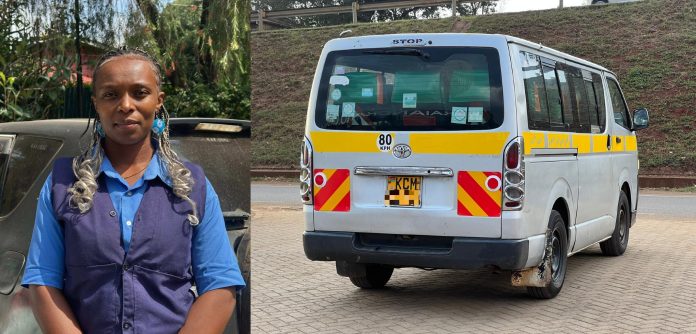Anastacia Wamuyu is among the few female matatu drivers navigating the chaotic Nairobi matatu industry.
She drives a 14-seater matatu, plying the Nairobi CBD-Waiyaki Way route. Before venturing into the industry, Wamuyu, a marketing and tourism graduate, had worked as a taxi driver.
“I was a housewife and had a small Nissan Note. When my marriage ended, I became a single mother and had to use my car as a taxi,” she says.
She later exited the taxi business to work as a school driver, but the income couldn’t cater to all her needs, prompting her to find another job.
She successfully secured a job in a tourism firm where she was tasked with transporting tourists to various destinations.
“I happened not to earn as well as I expected, and so I ventured into Tourism. While looking for a job, I found one as a driver picking people from the airport and taking them to places like the Masai Mara, Nanyuki, the National Park, and animal orphanages,” she told Money254.
However, her pay was commission-based and inconsistent to raise a family. That is when she turned to a matatu Sacco.
Ndindi Nyoro: Building houses, apartments is not a good investment
Her typical day as a matatu driver begins at 6 am until around 8 pm. Wamuyu drives a 14-seater matatu, which makes Sh13,000 on a normal day.
She explains that from the amount, drivers and conductors end up with at least Sh2,000 each in income from the day’s haul.
According to her, earnings can be affected by the type of vehicle in use. For instance in manual matatus, the owner takes Sh3,000, fuel costs Sh5,000, leaving Sh5,000, which is split Sh2,500 each for her and the tout.
On the other hand, automatic matatus consume Sh6,000 in fuel, leaving Sh4,000 split Sh2,000 each.
Other daily expenses she and her tout have to factor in include Sh200 for a wash, and Sh20 per trip for the junior stage marshal.
Additionally, all drivers within her Sacco benefit from allowances of Sh100 breakfast, Sh200 lunch, and Sh100 evening tea, excluded from their daily income.
“The money is divided equally between the conductor and the driver because the tout cannot earn more than the driver,” she explains.
“What I love about this industry is that it is like you have employed yourself. It is not tiring, and you get off days. I can hand over the vehicle to another driver when I feel tired,” she adds.
According to her, 14-seater matatus are attractive because they consume less fuel, fill up faster than buses, and make more trips, translating to better daily returns.
“In the future, I aspire to buy 3 or 4 matatus, especially 14-seater versions, because they do not consume a lot of fuel. A 14-seater matatu makes a lot of money because the more trips, the more it earns. Also, it fills quickly than a bus, meaning it makes more trips, translating to more returns,” she notes.









